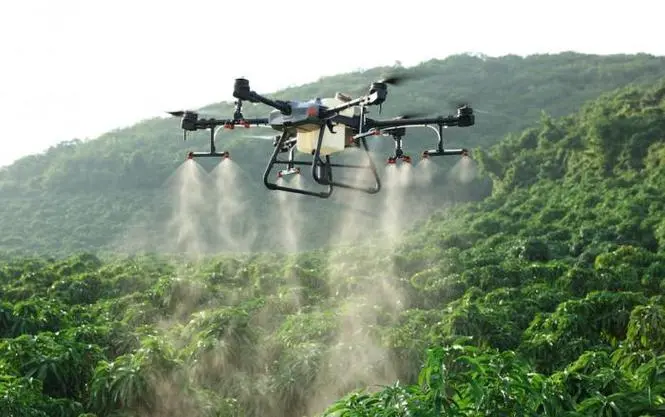During the critical period of rice field management in summer, the staff stood in the shade of the ridge and lightly clicked the remote control. They saw a drone loaded with fertilizer slowly take off, shuttle through the field according to the established route, and accurately spray fertilizer on the seedlings.
Drone operation not only saves time and effort, but also saves labor costs, with more uniform spraying and wider coverage Huang Jin’an, the person in charge of Hubei Heyi Garden Planting Professional Cooperative, introduced that in the past, it took 10 workers about 5 days to fertilize 500 acres of rice fields once. Now, one drone can be completed in 6 hours, and applying a small amount of fertilizer multiple times is more conducive to the growth of rice.
Last November, the smart farm under the Hubei Heyi Garden Planting Professional Cooperative was put into use, with the first trial planting of 500 acres. It is the first smart farm experimental site in Huanggang City, also known as the “unmanned farm”. Compared to traditional agriculture, the advantage of unmanned smart farms is that they transform “relying on nature for food” into “relying on technology for food”. From plowing, transplanting, spraying, irrigation to harvesting, the entire agricultural production process only requires the operation of mobile phones and computer systems to achieve “sitting in the office farming”. In front of the smart agricultural Internet of Things management platform, with a light click of the mouse, the situation of agricultural diseases and pests, seedling conditions, soil moisture, and meteorological conditions can be clearly seen at a glance.
To ensure timely sowing of late rice after the early rice harvest, unmanned aerial vehicle aerial seeding technology is used to operate 24 hours a day, covering over 3000 acres of double cropping rice. The planting is completed in 4 days Huang Jin’an introduced that this year, the average yield of early rice per mu reached 1052 jin, with an average increase of 67 jin per mu. Late rice transplanting is also completed 3 days in advance, and transplanting one day earlier provides more guaranteed yield.
Huang Jin’an introduced that in the future, an intelligent monitoring system for the entire process of agricultural production will be developed, which will divide the farmland into blocks and “sign” them to monitor the acidity, alkalinity, rainfall, temperature, wind speed and other conditions of each field and seedling. With the accumulation of system data, the degree of accuracy will become higher and higher. Staff will use the data to issue instructions to drone equipment, carry out more intelligent operations, and make rational use of resources.
To plan a new way to extend the industrial chain, and strive to make Xishui’s special Rice noodles production base bigger and stronger. ” Huang Jin’an introduced that this is a whole industry chain project including raw material production, rice processing, Rice noodles processing and sales. After completion, it can develop and drive the local special rice production base of more than 100000 mu, and achieve sales revenue of more than 100 million yuan.







Please sign in to comment
register